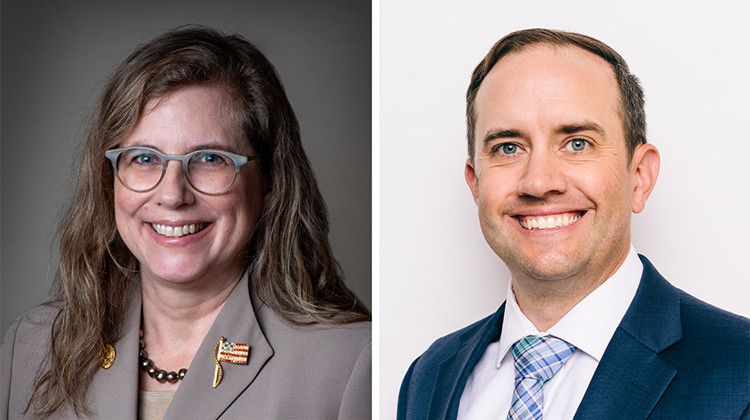
Democratic incumbent Chris Campbell and Republican Fred Campbell are running for the Indiana House District 26 seat.
provided photosTwo candidates are running for Indiana House District 26: Democratic incumbent Chris Campbell and Republican Fred Duttlinger. The district primarily covers the city of West Lafayette, with its western boundary following along the Wabash River.
Campbell was first elected in 2018 and ran unopposed in 2020. She almost ran unopposed again in 2022, until Duttlinger announced his run just before the filing deadline. Duttlinger currently serves as the Assistant Director of Civics Literacy at Purdue University.
Each candidate answered the same questions, to help voters prepare for early voting and Election Day, Nov. 8. They are below, in alphabetical order.
Editor’s note: Candidate responses were edited for AP Style and grammar, and any numbers used were checked for accuracy. When a statement required more clarification or could not be independently verified, WFYI reached out to candidates before publication. Those instances, and those candidate responses, are noted throughout in editors’ notes.
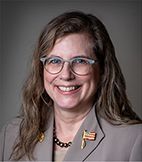
Chris Campbell
What do you see as the most pressing issue lawmakers will address in the upcoming legislative session?
I’m sure the debate over abortion will likely continue. Many lawmakers felt the abortion ban did not go far enough, while I feel the infrastructure to handle the negative impacts of the abortion ban will need to be a high priority.
With Indiana leading states with the third highest maternal mortality rate and seventh highest infant mortality rate,** the abortion ban will only increase maternal and infant deaths. Pregnant women are dying at higher rates in Indiana than in many developing nations. Lack of access to prenatal and postpartum care, to safe affordable housing and childcare options, along with food insecurity, substance use disorder, and poverty are reasons for these rates.
Decreasing unwanted pregnancies and abortions could be obtained by expanding access to contraceptives. Passing legislation to allow pharmacists to prescribe hormonal contraceptives is one suggestion to achieve this goal. Currently, costly doctor visits are out of reach for many women in Indiana and are required before a prescription for contraceptives can be obtained.
In addition, improving education by providing age-appropriate, medically accurate, comprehensive sex education has proven to reduce pregnancy rates among teens. Although these two measures failed during the special session when the abortion ban was passed, these are important measures if unwanted pregnancies are to be avoided. Women need to have options about when to have children.
**Editors’ note: The most recent data on infant mortality rates from the Centers for Disease Control and Prevention shows Indiana in ninth place nationwide.
Indiana’s schools are facing numerous challenges including teacher shortages, racial achievement gaps, reading ability and declining college-going rate. What do you see as the state’s top education issues, and how would you address them?
The upcoming session will be a budget year. I feel the budget will be an enormous issue that will face the challenges of inflation, balancing the budget, and making sure we are fully funding the commitments of the state.
The Indiana General Assembly is going into a budget year with over a $6 billion surplus. Two years ago the state added an extra $1 billion** to the education budget by using federal Covid relief dollars. At the same time, eligibility for vouchers was expanded to high income families allowing them to receive a 90% vouchers that the state would pay for the cost to a private school for their children. The voucher program takes state tax money away from public schools.
Historically the state only increases the education budget 1-2%, which has also been under inflation rates. I assume a return to similar funding increases. Traditional public schools in our state did make increases to teacher pay in the last budget year by adding an extra $1 billion** of Federal Cares money and must continue to keep Indiana a competitive state in recruiting and maintaining quality teachers.
Indiana public schools still have other staff to consider when keeping up with pay rates and competition for workers in the state. The academic loss for many students due to Covid will likely continue. By attracting and retaining paraprofessional workers through an increase in the pay, schools could provide the additional staff needed for critical educational support of our students that have fallen behind due to the challenges of the past couple years.
**Editors’ note: The increase in the education budget was funded with state revenue, not federal COVID-19 relief. School districts across Indiana did increase teacher pay.
Indiana lacks affordable housing inventory and communities across the state deal with landlords who shrug off local health and safety violations. How would you address the state’s lack of affordable housing and laws to protect tenants from bad-acting landlords?
I am working on legislation for tenant rights to assure that Hoosiers not only have the rights they deserve when it comes to safe affordable housing, but that we hold landlords responsible for maintaining safe living spaces for individuals and families. I have also authored safe housing inspection legislation in the past.
With the high percentage of rental properties in our district, protecting tenants is an ongoing concern. There are landlords who have high numbers of lawsuits brought against them every year. It is important to find ways to address those bad players while at the same time, addressing the growing demand for affordable, safe housing in the district. I am committed to finding solutions to address these issues while not sacrificing quality and safety in new construction.
In recent legislative sessions, state lawmakers have tried to regulate local decision-making; two examples are wind turbine regulation and bail reform. How would you approach issues of local versus state control as a lawmaker?
The wind turbine legislation that the state has worked on for the past couple years has been to establish standards for wind turbines in the state. I support establishing standards just as we have for electricity and telephone lines, cell towers and other forms of utilities. It’s an important step as the country prepares for the transition away from fossil fuels. I support establishing these standards as we work with local communities to address the concerns to include sound, height, location, shadow flicker or additional needed restrictions, all of which have been in this legislation.
Bail reform is another matter. These additional restrictions imposed on bail restrictions only impact those in poverty who are unable to post bail, while allowing those with the same or similar crimes to walk free if they have the means to post bail. This new law favors the bail bond industry profits by making high interest bail bonds the only option for people in poverty.
Indiana lawmakers voted to ban most abortions, with narrow exceptions for rape, incest and certain serious medical complications and emergencies. Would you support the legislature revisiting Indiana’s abortion law? What would you change?
I absolutely reject the legislation that was passed in SB1 during the 2022 special session. I completely support legislation revisiting Indiana’s abortion law, although I suspect it is unlikely to occur in the next session unless, unfortunately, there are attempts to further restrict access to abortion.
As I mentioned before, expanding access to contraceptives and providing age-appropriate, medically accurate, comprehensive sex education in schools can reduce the need for abortion. These are measures I will continue to fight for along with women's reproductive rights and choices.
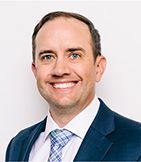
Fred Duttlinger
What do you see as the most pressing issue lawmakers will address in the upcoming legislative session?
The most pressing issue is the budget. Hoosiers have been battling high prices across the board since the beginning of 2021. It will be very important for lawmakers to identify areas that the state should be funding as they are essential for quality of life across Indiana. Three areas that have a wide impact across Indiana are education, law enforcement and mental health.
We had a surplus to give back in the special session so I would be supportive of finding ways for Hoosiers to keep more of their money to help offset the current Washington, D.C. driven economic hardships. I would also be looking at ways to prepare for a hard recession like we experienced in 2009 so we never have to see drastic cuts to areas such as education in national bad times again.
Indiana’s schools are facing numerous challenges including teacher shortages, racial achievement gaps, reading ability and declining college-going rate. What do you see as the state’s top education issues, and how would you address them?
I am a history teacher, the son of a K-12 educator who became a professor, a history teacher, am married to an educator, and have worked in education for over 11 years. I know that as a society we are nothing without a strong and supported education system. I have met with many teachers, administrators, and associations such as the Indiana State Teachers Association and the Indiana State Principals Association to hear about where they are struggling and what they need. The number one issue is battling our teacher shortage. I would address this with better teacher pay, finding ways to relieve the crushing regulations, unfunded mandates, and mandatory teacher trainings that are crushing school systems and morale. I am also in favor of supporting a better funding formula as well as being sure we are using testing that is providing a tool for teachers and students and not a number to punish with.
Indiana lacks affordable housing inventory and communities across the state deal with landlords who shrug off local health and safety violations. How would you address the state’s lack of affordable housing and laws to protect tenants from bad-acting landlords?
The lack of housing inventory has driven rents up in many areas including our own. There are many things that the cities of Lafayette and West Lafayette, including Purdue University, have been doing to help lessen this problem. As a lawmaker I would continue to support local governments and agencies as they battle the problem rather than trying to pass legislation that might work well in some cities and hurt others. I would be especially concerned over any unfunded mandates pushed upon cities and counties.
I would also want to hear from stakeholders, including tenants, about needs and wants. This would also include finding areas or groups in the state that have been showing success in these areas and see how we can help other localities adopt the same programs or practices.
Lastly, it should be taken seriously that a few bad-acting landlords exist because there are also many who are not. Often legislation to stop some bad acts ends up detrimentally impacting those who are not the bad actors by crippling regulations or fees. We need to do things that help tenants find resources to help them against bad-acting landlords and support cities and towns in ways that allow them to find and stop those landlords who are taking advantage of tenants.
In recent legislative sessions, state lawmakers have tried to regulate local decision-making; two examples are wind turbine regulation and bail reform. How would you approach issues of local versus state control as a lawmaker?
Lawmakers should strive for decision-making powers to remain at the most local level possible. We have a diverse state and things that work in one place could be detrimental in another. Counties, towns, and cities often know what works best for them. Supporting local control also allows for more innovation. Often the centralization of power causes innovative ideas to be stifled or only allowed as “pilot” projects funded by the state or federal government. We have an amazing district that has some of the best schools, businesses, and service organizations in the state. As a state representative I would fight to make sure we continue to prosper and not be stifled by ‘one size fits all’ state legislation.
Indiana lawmakers voted to ban most abortions, with narrow exceptions for rape, incest and certain serious medical complications and emergencies. Would you support the legislature revisiting Indiana’s abortion law? What would you change?
Legislation can always be revisited. One of the things that often happens within our governing bodies is the inability to revisit past legislation. For instance, the regulations placed on teachers and school administrators are being constantly added to while no one is revisiting the past regulations to determine what regulations could be taken away.
During the special session the legislature missed an opportunity to lead the nation with a bill that was pro-life for both women and babies. Our maternal death rates are far higher than they should be. Our rural areas are finding it harder to access pre-natal care, labor and delivery, and post-natal care as hospitals and doctors continue to be centralized. Birth control access and education is often unaffordable and/or unattainable for many women who then seek an abortion. I would change the process to be constituent driven and multifaceted.
How to vote in Indiana:
Vote by Mail Application Deadline: Oct. 27, 2022 at 11:59 p.m. (local prevailing time).
Election Day is Nov. 8, and you can find your polling place at the Indiana Voters Portal.
 DONATE
DONATE





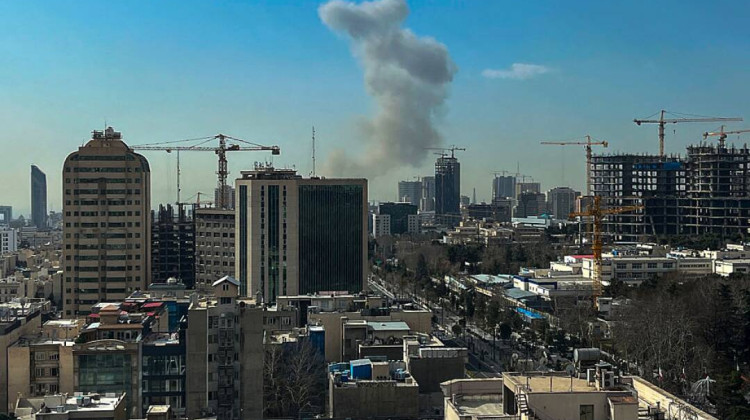
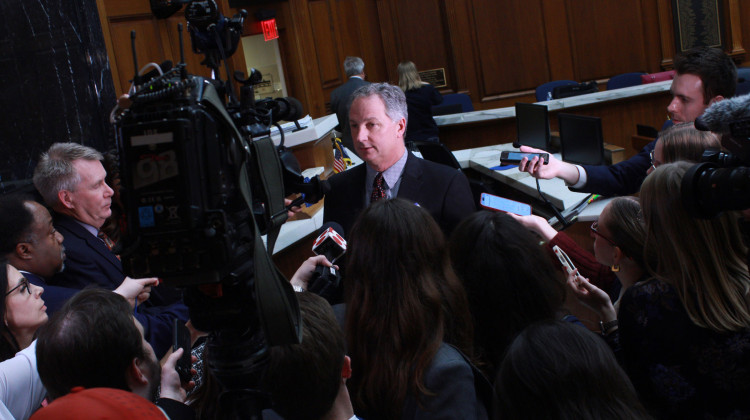
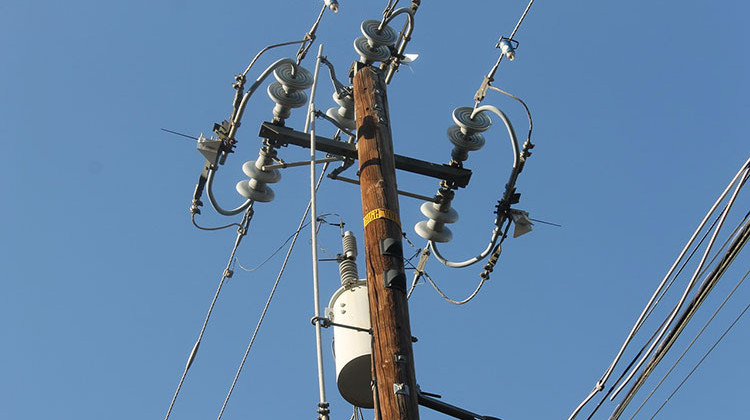

 Support WFYI. We can't do it without you.
Support WFYI. We can't do it without you.